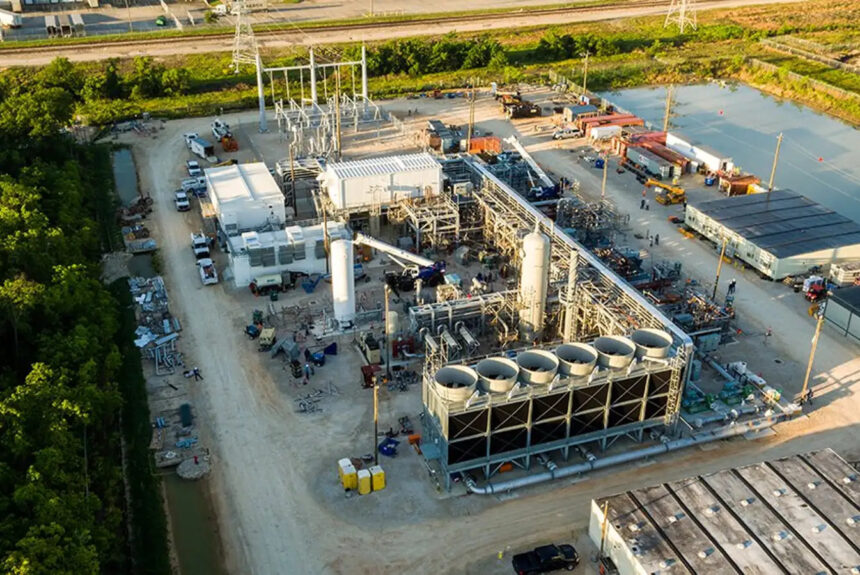For climate activists, there’s an alleged easy fix to climate change: halting consumption of fossil fuels. We could stop using natural gas, oil, and coal, and the vast majority of global emissions would be eliminated. Groups like Just Stop Oil and Extinction Rebellion advocate for exactly this. If the answer is so simple, why don’t we stop new fossil fuel projects and switch to 100% renewables?
Because without a secure supply of fossil fuels, we would all be unfathomably poorer and less secure. Energy expert Vaclav Smil frames the ubiquity of fossil fuels in modern society as the “four pillars of civilization”: cement, steel, plastics, and ammonia, all of which are fossil fuel-dependent. Producing these materials requires 17% of the world’s primary energy and generates a quarter of fossil fuel CO2 emissions.
>>>READ: Crossing the Climate Chasm Through the Gulf of Mexico
Thankfully, some world leaders like British Prime Minister Rishi Sunak understand this. In a recent interview, Sunak affirmed that “we are going to get to net zero, but even when we’re there we will still need fossil fuels.”
Of all humans alive today, 9% live in extreme poverty, surviving on less than $2.15 a day. Conventional fuels have reduced this number significantly over the past two centuries: In 1820, prior to the Industrial Revolution and the inclusion of high-density fossil fuels into our energy supply, over 75% of the world lived in extreme poverty.
The benefits of fossil fuels for society are undeniable, yet many climate activists are quick to demonize them. While these activists represent a small portion of the population and hold little sway in elected politics, they appear to be rubbing off on Gen Z.
According to a recent Pew Research Center survey from April, 48% of respondents ages 18–29 believe the U.S. should “[p]hase out the use of oil, coal and natural gas completely, relying instead on renewable sources” while 50% said they wanted to “[u]se a mix of energy sources including oil, coal and natural gas along with renewable sources.” This differs sharply from older generations: just 35% of 30–49, 24% of 50–64, and 20% of 65+ feel the same way.
This desire for 100% renewables ignores reality. Fossil fuels made up 82% of the global energy mix in 2021 for a reason: they’re cheap and reliable. Getting the world to 100% renewables would incur an enormous cost, pose serious reliability issues (due to the inherent intermittency of renewables), and would hold back economic development, particularly in the developing world.
It’s very likely not feasible for the U.S. to subsist entirely on renewables (even if the question had included nuclear power or firm clean energy with renewables, it would still be extremely difficult any time soon). Our food, homes, offices, cars, phones, and medicines all rely almost entirely on fossil fuels. To rid ourselves of fossil fuels without viable alternatives that meet our economic and national security demands would be foolish and regressive.
Additionally, renewable supply chains — solar panels, lithium-ion batteries, and the critical minerals that build them — are concentrated in China. China controls 80% of critical solar-panel manufacturing and will produce over 95% of the world’s polysilicon and wafers in the near future. It would be unwise to rush into renewables too quickly when their supply is dependent on our greatest strategic rival.
Natural gas and crude oil are among America’s top exports, and they are sorely needed by our allies in Europe. This past winter, which was fortuitously warm, American natural gas exports provided Europe with a secure, stable energy supply in the absence of Russian exports. Future winters may not be so kind, and U.S. energy producers should be prepared to increase exports. Energy security for America and our allies is a paramount concern, and achieving it requires strong fossil fuel production at home.
Fossil fuel firms are also investing heavily in carbon capture, use, and storage technology, which can capture and sequester more than 90% of CO2 emissions from power plants and industrial sites. According to The Center for Climate and Energy Solutions, carbon capture can achieve 14% of the global greenhouse gas emissions reductions needed by 2050.
While there are detractors who claim that carbon capture investments are no more than “greenwashing” efforts from fossil fuel companies (it is true that it would allow oil and gas producers to produce without increasing emissions), the positive impact on net zero goals can’t be ignored. We must focus on reducing emissions at the lowest possible cost; the methods should be irrelevant so long as they contribute to net zero. Companies like Occidental, Exxon, and Chevron — all of which aim to be net zero by 2050 — can and should lead the way in reducing emissions while ensuring our energy supply remains secure.
>>>READ: Fueling a Better Future
Renewables, batteries, and nuclear power will play an increasingly important role in the world’s energy mix, and there are ways policymakers can increase clean energy capacity by reforming the permitting process and unleashing the private sector to invest in domestic supply chains for uranium and critical minerals. But assuming fossil fuels will disappear without significant cost to human welfare is devoid of reality.
Benjamin Khoshbin is a Contributor for Young Voices, where he writes on energy and environmental issues. He is also a Senior Account Executive at ROKK Solutions, a bipartisan public affairs firm in Washington, D.C.
You can follow him on Twitter at @BenKhoshbin, and view his other writing and media appearances here.
The views and opinions expressed in this piece are Benjamin’s alone, and do not necessarily reflect the views or positions of ROKK Solutions or its clients.
The views and opinions expressed are those of the author’s and do not necessarily reflect the official policy or position of C3.
